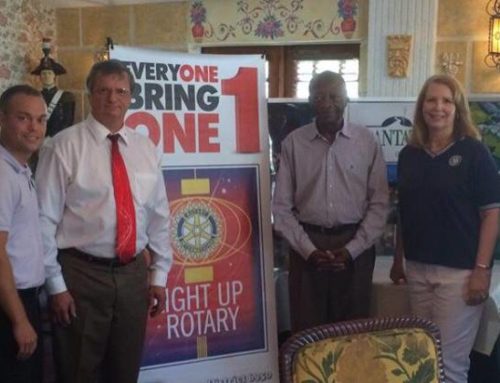Maya Ajmera founded the Global Fund for Children in 1993 to provide seed money to community-based organizations that help at-risk children across the world. Since then, GFC has awarded more than $32 million in grants to over 600 organizations in 80 countries, improving the lives of millions of children – from educating AIDS orphans in Uganda to conducting so-calledcurbside classrooms for waste pickers in Cambodia.
“Education is the key to getting human beings out of poverty,” says Ajmera, whose studies at St. Xavier’s College in Mumbai were sponsored by the Rotary Club of China Lake in California. “Community-based organizations are probably the most creative in being able to find the most marginalized children and provide education that is meaningful and makes sense in their lives.”
In recognition of her work, Ajmera was chosen by The Rotary Foundation Trustees to receive the 2013-14 Rotary Foundation Global Alumni Service to Humanity Award. She will receive the honor at the Rotary International Convention in Sydney on 3 June.
Ajmera credits extraordinary leadership at the grassroots level, combined with the ability and willingness to work as partners, for GFC’s success. “Trust is really important,” she says. “You also need good ways of measuring outcomes: how many kids got educated, how many were kept off the streets, how many got psychosocial counseling.”
Nowhere was the need for leadership and trust more evident than in Afghanistan in the 1990s. GFC awarded $5,000 to the Afghan Institute for Learning to fund the secret education of 600 girls. Even after the September 11 attacks, GFC continued its support, including a $25,000 sustainability grant to establish a reserve fund. Today, the institute reaches more than 400,000 women and children annually with education and health care. GFC has also released over 30 children’s books, including “Children from Australia to Zimbabwe,” co-authored by Ajmera, of which a portion of the proceeds from sales support the organization’s grant making. And it’s invested in documentary films like “War Child,” which tells the story of hip hop artist Emmanuel Jal, a former child soldier in Sudan’s brutal civil war. Jal spoke at the Rotary World Peace Symposium in Bangkok in 2012.
Ajmera stepped down as GFC’s president in 2011. She is now a visiting scholar and professorial lecturer at the Paul H. Nitze School of Advanced International Studies at Johns Hopkins University in Washington, D.C., and social entrepreneur in residence and visiting professor of the practice of public policy at Duke University in Durham, North Carolina.
“For me, Rotary was an incredible inspiration,” says Ajmera, adding that without the scholarship there wouldn’t be a Global Fund for Children. “The scholarship fed my soul.”
ALUMNI ASSOCIATION HELPING TO END POLIO
The alumni association of District 3020 in India can take pride in knowing they helped make history. On 27 March, the World Health Organization certified that Southeast Asia, which includes India, had eradicated polio.
“
In recognition of their humanitarian work, the association has been selected to receive the 2013-14 Rotary Foundation Alumni Association of the Year Award. The award will be presented to K. Soma Sundera Sai, founder and longtime president of the association, and other association members at the Rotary Alumni Celebration in Sydney on 31 May.
Many of the members are Rotarians who have been involved in grant-funded service projects, from establishing an orphanage in India to creating a sustainable health care program for schoolchildren in Thailand.
Sai says association members are all about staying connected – to each other, their communities, and Rotary.
“Once I realized the value and potential of the alumni to Rotary and its Foundation, it became a part of my life,” says Sai.
Rotary News

